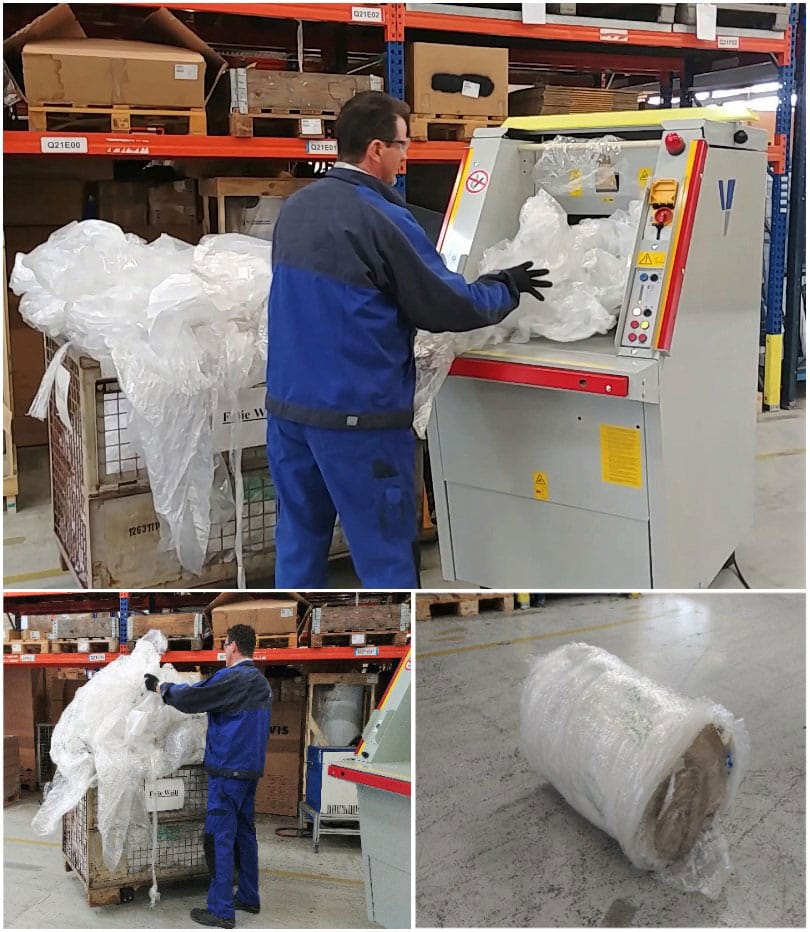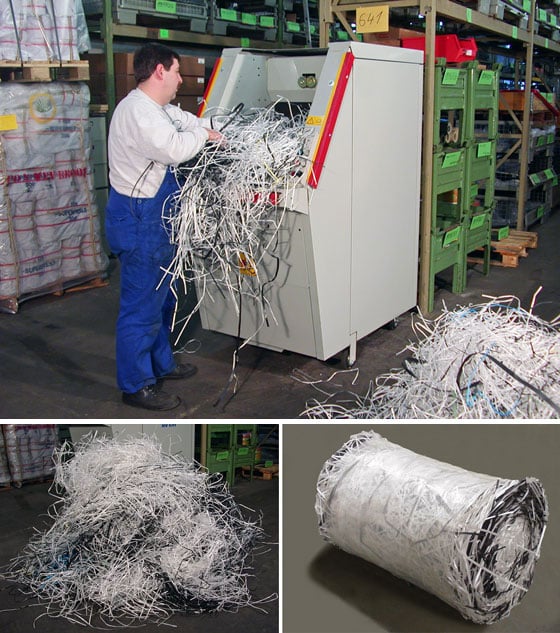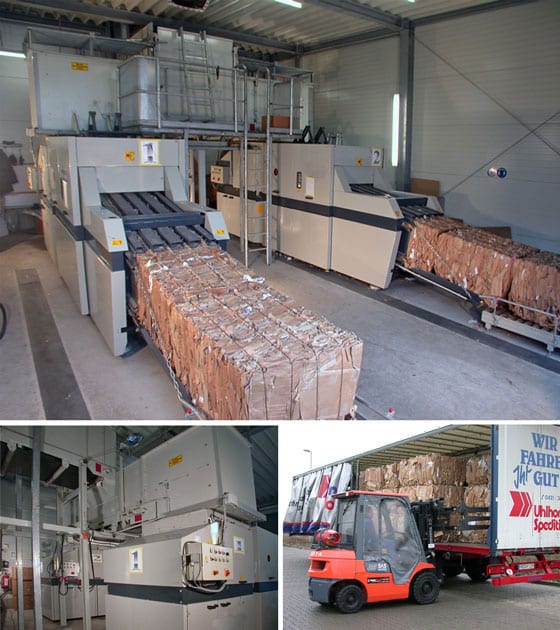Recyclable waste baling machine
Waste is a matter of utmost global importance. Intensifying its recycling implies efforts that can bring major benefits to the environment. Recycling can generate significant savings. It improves company work processes regarding packaging or production waste.
- Cardboard
- Paper
- Aluminium foil and bags
- Plastic strapping
- Foil strips and bags
- PP/PE fibres and films
- Packaging foam
- Nonwovens materials
- Big Bags
- Insulating materials
- Textile wadding
- Tetrapak
- Cardboard boxes (solid and corrugated board)
- Paper
- Plastic sacks, bags and films
- Big Bags
- Insulating materials
- Nonwovens materials
- Textile wadding
- Tetrapak
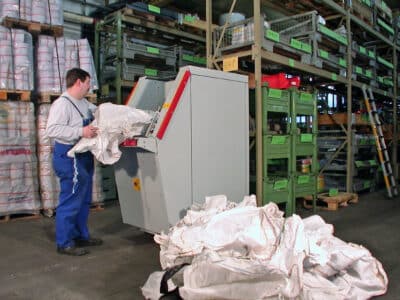
Mobile recyclable waste baling machines
The separation and disposal of recycling waste is faster and much more efficient when made at the place of occurrence. Mobile compact balers serve this exact purpose. In addition, they provide high operating convenience and flexible use.
They have fixed and swivelling wheels. This allows operators to move the machines wherever waste appears in the workspace. They do not need additional equipment for this internal operation.
The small but sturdy construction enables the placement of these waste balers in narrow spaces. In addition, they can operate in places where customers are present. This feature makes them suitable for retail trade and small and medium-sized companies. These systems provide a compaction capacity of around 300 kg of recyclable waste per hour. Their average is ten bales per hour (each bale reaching a maximum 400 mm diameter and a standard 600 mm length).
An operator has to place the material by hand on the feeding table. Further, it is sent into a filling tunnel. From there, it gets pulled inside the machine and compacted by special conveyor belts. The material feeding can be interrupted at any time and upon need without affecting the compacted waste. It remains pressed in the formed bale, preventing it from re-expanding.
After reaching the intended diameter (adjustable in some models), the binding initiates manually. An operator must introduce the stretch foil’s end into the feed opening. The bale wraps into the foil and evacuates through an electric flap. Once the binding process has been completed, the stretch film separates by a cutting device. During compacting, a luminous scale displays the filling level. Acoustic and optical signals announce the diameter limit.
The bale’s binding and ejection can occur automatic or semi-automatic. This feature is distinctive on the machine model. Clients can opt for adjustable operating time and automatic shutdown for overload protection. They increase these mobile waste compactors’ efficiency and safety levels.
Mobile balers can compact a wide variety of packaging materials, recorded by type, such as:
| Reference | Title | Dimensions (mm) | Weight (kg) | Feeding table height (mm) | Feeding table width (mm) | Bale diameter (mm) | Bale length (mm) | Bale weight (kg) | Baling capacity (kg/h) | Strapping material | ||
|---|---|---|---|---|---|---|---|---|---|---|---|---|
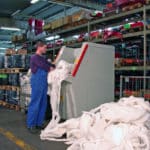 | MRD 01 | Mobile waste baling machine MRD 01 | 1490 x 900 x 1750 | 540 | 1080 | 600 | max. 400 | 600 | max. 30 | 300 | stretch foil de 23 μm | View product |
 | MRV 05 | Mobile waste baling machine MRV 05 | 1610 x 940 x 1800 | 675 kg | 1060 mm | 600 mm | max. 400 | 600 | max. 30 | 300 | stretch foil de 23 μm | View product |
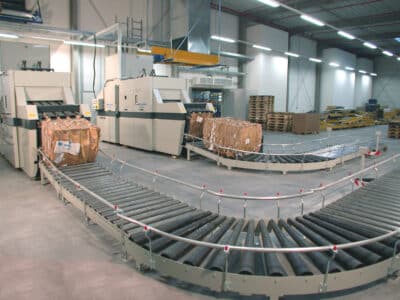
Stationary recyclable waste baling machines
Many industrial and commercial sectors’ production and sales processes generate waste. It must be disposed of constantly. This ensures a clean work environment and a smooth logistic flow. The stationary channel balers allow separate processing. In addition, they can compact various materials as they accumulate. Eurobox specialists recommend them in production and sales points where high volumes of waste must be permanently collected and removed from the dedicated area.
Horizontal stationary waste baling machines offer a large compacting capacity. They provide a high degree of automation, as well. Despite the broader dimensions and robust appearance, they can integrate into nearly any industrial flow. This is due to their compact and modular design. They require a low labour input and ease of function. The operators’ efforts lower, and the production increases. Operations can occur in any work environment in a safe and flexible manner. This happens thanks to the emergency, protection and overload shutdown devices.
The range comprises efficient channel balers with a pressing capacity of up to 3 tons of waste per hour. They transform bulk waste, including voluminous cardboard boxes, into stackable bales. As a result, the occupied space in storage and transport is much reduced. This lowers expenses related to waste disposal, as well.
The available models refer to repeatedly feeding baling presses. These models have an advanced modular degree in constructing the feeding devices. Operators can provide the materials manually, automatically or combined. This depends on each application. In the case of automatic feeding, the main frame completes in various ways. It implies using conveyor belts, air technology, and lifting or tilting devices. They can all be adapted to the available space, the work conditions and different material sizes.
In the case of the MBD 02 model, a press piston compresses the material. Then, it gets tied up and forms bales with a length between 600 and 1200 mm. Industrial waste balers MBD 03 use a hydraulic press piston to compact the intended waste. It stands out by the high throughput for large format waste materials. The machine produces bales of 800 – 1500 mm, which are variably adjustable.
Stationary waste baling machines can compact a wide variety of packaging materials. They are recorded by type, such as:
| Reference | Title | Dimensions (mm) | Feeding table height (mm) | Feeding table width (mm) | Bale length (mm) | Bale diameter (mm) | Bale weight (kg) | Baling capacity (kg/h) | Weight (kg) | Strapping material | ||
|---|---|---|---|---|---|---|---|---|---|---|---|---|
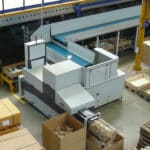 | MBD 02 | Stationary waste baling machine MBD 02 | 4000 x 2100 x 2000 | 900 | 800 - 1000 | 600 - 1200 | N.A. | 40 - 60 | up to 2 t/h | 1950 | N.A | View product |
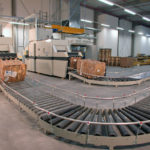 | MBD 03 | Stationary waste baling machine MBD 03 | 5035 x 1400 x 2600 | 1200 | 800 | N.A. | N.A. | 150-365 | 3 t/h | 3650 | wire with diameter of 2,5-2,8 mm, greased, in coils of approx. 40 kg | View product |
Managing and disposing of recyclable packaging is often organized in a modern manner. It applies to production waste as well. In consequence, one or more containers exist outside the workspace. This involves expenditures with renting or purchasing the container and collecting the waste. In addition, internal handling has significant costs. The staff uses time, space and resources to manage the resulting waste from each daily activity.
The rewards received from the recycling companies for the bulk waste are often minimal. This is why members of the companies may lose their interest and motivation to manage their waste responsibly. Despite the obligations, everyone has to use the raw materials resources with maximum economy. Companies have to capitalize on them in the best possible way.
Eurobox Technologies proposes a sole concept for recyclable waste management and disposal. It bases on analyzing materials, their volume, the available space requirements and the workflow. Our concept refers to industrial baling machines destined for large production and packaging waste. They are designed to compress and bind single-flow materials into uniform bales. This makes the materials easy to handle, store and transport.
The waste compaction equipment generates cost savings by reducing storage and transit space. It enables faster and safer waste handling. Compacting operations increase the revenues from recycling. They enhance the independence of the collecting companies. In addition, they facilitate waste sales. At the same time, they increase the operators’ productivity. This reduces their efforts and relieves the permanent struggle to maintain order, cleanliness and accessible areas in the workspace.
Applications and sustainability
Industrial waste compactors suit every company that strives to implement an intelligent material management solution. All models can integrate into any production and disposal process. Specialists recommend them for large distribution and logistics centers and sales points. Food and beverage, paper, furniture, automotive and many other industries can also use them.
Despite the high degree of automation, the recycling balers have a low power consumption. They require facile maintenance and service work. User-friendly operation offers flexibility to the personnel. It enables improved waste handling by fast and easy internal compacting procedures whenever required. These baling machines meet the highest safety and health requirements. This equipment is durable even in permanent use. It promotes a more hygienic work environment and a more conscious waste approach.
The balers for waste management preserve natural resources. By encouraging selective recycling, the consumption of new materials reduces. Used and compressed materials – often valuable – can reappear in the economic circuit. At the same time, the impact on the environment can lower due to decreased waste amount. It would otherwise end up in nature. In addition, the compacted waste takes up less volume in the truck. This way, the required amount of fuel reduces and carbon emissions decrease.

